On our return from Germany, Carlo and I continued to make vague plans for the new project, but a recurrence of an old problem – namely severe tonsillitis – was making it almost impossible for me to sing harmony for Billie, let alone tackle complete songs, as I had done with the Pirates. A visit to hospital confirmed that I needed an operation. “How long?” I enquired. “Between one and two years” came the reply, so my name was added to the list.
The shows with Billie continued. P. J. Kelly left, for reasons long forgotten, and was replaced by a terrific organ player called Arthur Regis, a friendly well-spoken bloke, who fitted in perfectly. No sooner had Arthur joined when I received a mysterious phone call from Roger Truth, asking me to meet him in Soho to discuss a business proposition. Intrigued, I headed for the Van Gogh bar in Rupert Street where Roger had once more taken the gig with Buddy Britten, who had now permanently become Simon Raven. Roger explained that he had found a benefactor who was interested in financing a new group, and introduced me to a young lady he called “’Enry”. ‘Enry, it appeared, had spotted Roger’s talent on her frequent visits to the Van Gogh, and of course he had recommended me to her. I explained that it would be no problem to find the other musicians needed.
‘Enry had exquisite manners and poise, with the air of self-assurance that often surrounds people of wealth. I soon found out that she was, in fact, Lady Henrietta Guinness, of the famous brewing family! A date was arranged for me to come to the Van Gogh bar where I could perform a couple of tunes with Roger, apparently to satisfy her trustees that we were a viable proposition. Once this task was performed, we provisionally brought Arthur Regis and Ged Peck on board, before beginning the search for a vocalist. Henrietta was arranging the purchase of a Tudor manor, where, she explained, we all would live. I lost no time in calling up Terry Marshall at the new amplifier factory in Bletchley, swiftly placing an order for several new Marshall stacks to amplify the new outfit. Meetings now took place at Henrietta’s headquarters, a fabulous King’s Road Italian restaurant called Alvaro’s, where Roger and I were wined and dined in style. Henrietta celebrated her birthday with a huge party at Sybilla’s nightclub near Piccadilly, where we rubbed shoulders with the rich and famous. At the time I was taking snuff to try and wean myself off cigarettes. One of the guests invited me to try some of theirs, which I did, only to discover that it definitely wasn’t snuff! On waking up in Roger’s flat I found my memory of the previous night’s activities extremely hazy!
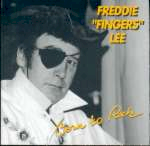
Whilst all these new plans were being laid, Billie Davis’ situation took a turn for the worse, with the cancellation of several months’ work. The reasons are now lost in the lists of time, but panic gripped Carlo, Ged, Arthur and myself, as we realised that our regular earnings had come to a halt! Carlo immediately rushed out to find his old boss David Sutch, who promptly engaged three of us to work as his group, the Savages. Arthur, however, was not included, as Sutch was using his famous one-eyed pianist, Freddy Fingers Lee.
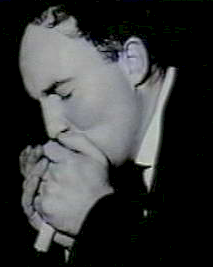
All of a sudden, amongst this whirlwind of activities, proposals and counter-proposals, I found myself working with yet another of my rock n’ roll heroes. Today he is often dismissed as an eccentric oddball, but no-one should underestimate the importance of Screaming Lord Sutch and The Savages in the history of British Rock. Their act was an absolutely awe-inspiring sound and spectacle, a totally amazing antidote to the majority of pop and rock during the 60’s, which definitely provided the impetus that drove many budding musicians to strive for success. Although others were on the fringe, the best line-up of Savages was undoubtedly Bernie Watson (guitar), Carlo Little (drums), Nicky Hopkins (piano) and Rick Brown (bass). Together they created an amazing wall of sound which was uniquely British, yet more powerful than most U.S. bands. As well as Sutch, this line-up had also worked with British Blues legend Cyril Davies, as the All-Stars, performing on the great recording of Country Line Special. The early Rolling Stones used to support them at London gigs such as the Marquee Club, According to Sutch, Mick Jagger and Brian Jones begged Carlo Little to join them, but Carlo was in a different league and so, naturally, turned them down. Keith Richards is often quoted as dubbing Carlo “the world’s greatest rock n’ roll drummer”, a sentiment I agree with entirely. There was little doubt that Sutch’s act had suffered recently, mainly due to the fact that he was unwilling to pay for good musicians, often recruiting the cheapest available, but he always relished the chance to use Carlo Little, knowing that he added class to the show. And so I found myself a “Savage”, working alongside Carlo as he played in that heavy style which always made him stand out. Freddy ‘Fingers’ Lee was also of legendary status, and with Ged Peck’s virtuosity we really could not fail!
Meanwhile negotiations continued with Henrietta Guinness, although at a somewhat slower pace, owing to the fact that I was now relishing the experience of being a ‘Savage’! How lucky can one get, I thought, having played with two of England’s best outfits, here I was with another – Screaming Lord Sutch and the Savages. David Sutch’s act had not changed in the eight years that he had been a top attraction, and I knew the collection of Fifties and Sixties rock n’ roll songs inside out. The difference with Dave, though, was that you had to brave fire, water and assorted weaponry whilst playing with the panache demanded by Carlo, who was also band leader and choreographer! The highlight for me though was seeing Freddy Fingers Lee cartwheel across the stage, landing with his head on a cushion strategically place on the keyboard of the piano, whilst Sutch, standing on top of the piano would grab Fred’s ankles, holding him in hand-stand position. Fred would then play an amazing solo, arguably playing better upside down than most pianists could achieve the right way up! Usually he would screw a car wing mirror onto the piano, thus allowing him to see the rest of the band with his one good eye. He also had a disconcerting habit of removing his glass eye band resting it on your shoulder, usually accompanied by the phrase “I’ve got my eye on you!”
For Ged and me, this period was an important part of our rock n’ roll education, an experience we would not have missed for anything!
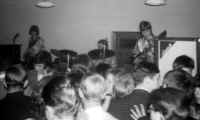
The rise to fame of Screaming Lord Sutch was initially due to his appearance. In 1959, waist-length hair had never been seen in England and so, until long hair became more commonplace, Sutch caused amazement and outrage wherever he appeared! Gigs with Sutch were never dull affairs. Girls would invariably scream with fear at his antics, often leading to their boyfriends becoming hostile and determined to show that Sutch was no-one to be afraid of! Several years before, I had taken three girls, including my future wife Janet, to see Sutch’s act at Northolt, where they were all so overcome with fright that we had to leave after several songs. Now, as a Savage, I was witnessing this effect from the stage.
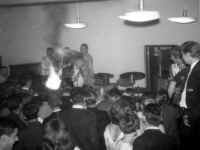
One memorable night, August 5th 1967, saw us playing in Narberth, Wales. The ball room was packed to capacity with a lively crowd, and as usual most of the girls were frightened to death by the spectacle of Dave Sutch doing his stuff. A handful of toughs stood at the front, led by a large bloke wearing a light blue suit, who seemed intent on causing trouble. He attempted to hold on to Dave’s microphone cable whenever possible, which limited Sutch’s stage movements. I could sense Dave getting annoyed. The moment arrived during our version of Jerry Lee Lewis’ “Great Balls Of Fire” when Sutch set fire to a container of newspaper and petrol, resulting in flames four or five feet high. I expected to see our tough guy move back from the heat of the fire, but he stood his ground, although it seemed that his eyebrows were in danger of vanishing! Sutch then ran across, ringing his big brass fire bell, carrying a 2 gallon fireman’s bucket of water to extinguish the flames with. The sight of the leering yobbo was too much for Sutch, however, and, instead of putting out the flames, he gave the bloke the 2 full gallons right in the face! Retaliation followed in the form of the tough guy’s pals launching themselves at the band in a crazy sea of flying fists and bottles. Under this onslaught the Savages retreated, whilst I wondered if we would survive! Suddenly the voice of Screaming Lord Sutch boomed over the P.A. system announcing that the police were in the building. Like magic, our attackers ran for the exit. Of course, there were no police, but Dave’s presence of mind had saved us from almost certain injury!
Apart from the occasional crowd trouble, it was tremendous fun working with Sutch and the Savages, and I found a friendship with Dave which was to last until his untimely death in 1999. By the end of August Billie Davis had secured a few more gigs, and so our work was now divided between her and Sutch. This was an extremely busy period, and so our plans with Lady Henrietta Guinness had been unavoidably slowed, resulting in her having a change of heart. For reasons never fully explained to me, she had decided to abandon the project, and so another opportunity was lost. I had to explain the situation to Marshall Amplification, who agreed to cancel my order for new gear. I didn’t see or hear from Henrietta again, but reading of her exploits in the press, I realised why she dropped out. It appeared that her romance with one of the staff at Alvaro’s restaurant had led to friction with her family, with the result that she married and moved to Italy, where she raised a son. The ensuing bad feeling kept her name in the newspapers for several years, until sadly in 1978 she took her own life.
On September 10th 1967, Billie Davis and the Quality began a week long engagement at Manchester’s Embassy Club. The venue was owned by a charismatic front man who was M.C., vocalist with the house band, resident comedian, and also a pretty decent impersonator. He came from working-class roots, had obvious empathy with us as performers, and sometimes drove us back to our digs in his new Jaguar car. His name, we learned, was Bernard Manning, destined to become a famous television performer in the not too distant future.
Whilst I never forgot Bernard, it was a severe dose of food poisoning that made the week unforgettable for me! The food in our digs left a lot to be desired, and by Tuesday it became necessary for me to stay close to the toilet. A system was worked out to deliver me onstage one minute before curtain up, and if necessary I was allowed to leave the stage for the nearest khazi!! By the end of the week I had recovered, bidding Bernard farewell, little knowing that he and his club would soon be nationally famous on TV. I also had no way of knowing that our association with Billie Davis was finally at an end.
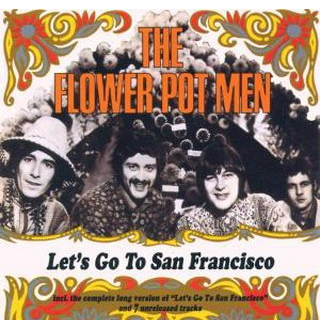 From out of the blue, Carlo Little had a telephone call from Spencer Davis Management. It appeared that they needed musicians to support a vocal act that they had signed, named the Flowerpot Men. A single called “Let’s Go To San Francisco” was riding high in the charts, so the logical next move was to get the act on the road, and Billie Davis’ band was in the frame for the job. Sensing a good earner, Carlo swiftly arranged a time and place to rehearse together. The only snag was that Arthur Regis and landed a gig with top soul act Jimmy James and the Vagabonds, so a keyboard player had to found quickly. I immediately thought of Billy Davidson, the amazingly gifted organist who I had met at Joan Watson’s shop. Luckily, he was free to complete the line-up, and so Bill, Ged, Carlo and I assembled at a London rehearsal room, where we were introduced to the four vocalists who had been appearing on TV shows all over Europe as the Flowerpot Men. We soon learned that the hot record had resulted from one of the many studio sessions regularly carried out by my old favourites, Carter and Lewis. They had given up performing in order to concentrate on recording their many compositions, some of which were leased out to various touring bands, who then changed their names accordingly. This they had done with their own group, the Ivy League, following many chart hits, and were now doing the same thing with the name Flowerpot Men, borrowed from a 1950’s children’s television programme. John Carter himself had sung the lead vocal on the record, with harmonies provided by a great session singer named Tony Burrows. Ken Lewis had supplied keyboard and piano, with my old mate Robin Scrimshaw playing bass. John and Ken had for many years written songs in varying styles and had now been able to use their skills to capitalise on the current ‘flower power’ rage which had recently arrived here from the USA. Tony Burrows, currently in a new Ivy League line-up, together with Robin, quickly recruited two other singers. Tony brought in Neil Landon, also from the Ivy League, and Robin brought in Pete Nelson, one-time front man of my old mates the Travellers, so it was a pleasant surprise to find that I knew two of the four singers.
From out of the blue, Carlo Little had a telephone call from Spencer Davis Management. It appeared that they needed musicians to support a vocal act that they had signed, named the Flowerpot Men. A single called “Let’s Go To San Francisco” was riding high in the charts, so the logical next move was to get the act on the road, and Billie Davis’ band was in the frame for the job. Sensing a good earner, Carlo swiftly arranged a time and place to rehearse together. The only snag was that Arthur Regis and landed a gig with top soul act Jimmy James and the Vagabonds, so a keyboard player had to found quickly. I immediately thought of Billy Davidson, the amazingly gifted organist who I had met at Joan Watson’s shop. Luckily, he was free to complete the line-up, and so Bill, Ged, Carlo and I assembled at a London rehearsal room, where we were introduced to the four vocalists who had been appearing on TV shows all over Europe as the Flowerpot Men. We soon learned that the hot record had resulted from one of the many studio sessions regularly carried out by my old favourites, Carter and Lewis. They had given up performing in order to concentrate on recording their many compositions, some of which were leased out to various touring bands, who then changed their names accordingly. This they had done with their own group, the Ivy League, following many chart hits, and were now doing the same thing with the name Flowerpot Men, borrowed from a 1950’s children’s television programme. John Carter himself had sung the lead vocal on the record, with harmonies provided by a great session singer named Tony Burrows. Ken Lewis had supplied keyboard and piano, with my old mate Robin Scrimshaw playing bass. John and Ken had for many years written songs in varying styles and had now been able to use their skills to capitalise on the current ‘flower power’ rage which had recently arrived here from the USA. Tony Burrows, currently in a new Ivy League line-up, together with Robin, quickly recruited two other singers. Tony brought in Neil Landon, also from the Ivy League, and Robin brought in Pete Nelson, one-time front man of my old mates the Travellers, so it was a pleasant surprise to find that I knew two of the four singers.
The rehearsal was overseen by Ken Lewis in person, and whilst I was knocked out to meet him once more, he was equally pleased to meet Carlo Little, who he greeted with the words “My, what a reputation you have got!!” Carlo blushed at this. “Have I?” was the best he could reply. The four singers then produced a list of 3 and 4 part harmony material by artists such as the Four Tops and the Four Seasons. They had obviously rehearsed their parts, and the whole package was sounding pretty slick after a two hour run through. Everyone seemed happy with the result, and so several more rehearsals were scheduled before taking to the road.
Carlo, as our elected spokesman, entered into tough wage negotiations. He felt that a top ten hit record would place the act in a high earning bracket, and that good musicians deserved good money. Using all of his considerable powers of persuasion Carlo secured a great deal, which provided us with an excellent retainer, whether we worked or not, plus a decent fee for each show. At last we were about earn serious money!
The next day saw us arrive at the Spencer Davis office where we were introduced to the staff, and provided with cash to buy some suitably “flowery” stage clothes. Following several more rehearsals we were supplied with a truck for us and our equipment. Armed with a full gig list, we were ready to hit the road! …
| Chapter 14 ← | → Chapter 16 |
